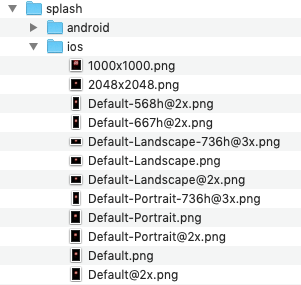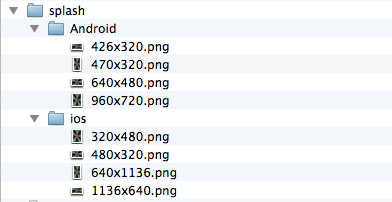SplashScreens: Difference between revisions
| Line 54: | Line 54: | ||
<pre> | <pre> | ||
<preference name="SplashScreenDelay" value="2000" /> | <preference name="SplashScreenDelay" value="2000" /> | ||
<preference name="AutoHideSplashScreen" value="true" /> | |||
<gap:splash src="{splashscreen}"/> | <gap:splash src="{splashscreen}"/> | ||
Revision as of 14:03, 23 October 2015
SplashScreens are displayed when your app starts. The way they work depends on the platform you are running on.
Web Apps
Splash screens only work on iOS. They are not supported on Android. To have them work effectively, you need to supply images for all the supported screen sizes.
Here's how to add splash screens:
- Add folder named 'splash' to your project directory.
- Drag it into the Project Explorer
- Add a folder named 'ios' to the new 'splash' folder.
- In the ios folder, put the following files:
320X460.png 640x920.png 640x1096.png 748x1024.png 768x1004.png 1496x2046.png 1536x2008.png New for iPhone 6 and 6 Plus: 1242x2148.png 2208x1182.png 750x1284.png
The resulting file structure will look something like this:

PhoneGap Apps
The default PhoneGap SplashScreen must be set in Project Properties. The file needs to be in the top level of the project folder. PNG images work best: the filename should also be added to the Manifest property.
The same file structure can be used as in Web App for the rest of the splashscreens. Here's how it could look:
The Web App images can be in the same folder.
Android
A similar file structure is needed as for web apps, but the screen sizes are different:
Create a folder in your Splash folder called android. Add the following files:
960x720.png 640x480.png 470x320.png 426x320.png 720x960.png 480x640.png 320x470.png 320x426.png
Add the following lines to the PhoneGap configxml property:
<preference name="SplashScreenDelay" value="2000" />
<preference name="AutoHideSplashScreen" value="true" />
<gap:splash src="{splashscreen}"/>
<platform name="android">
<splash src="splash/android/426x320.png" density="land-ldpi" />
<splash src="splash/android/470x320.png" density="land-mdpi" />
<splash src="splash/android/640x480.png" density="land-hdpi" />
<splash src="splash/android/960x720.png" density="land-xhdpi" />
<splash src="splash/android/320x426.png" density="port-ldpi" />
<splash src="splash/android/320x470.png" density="port-mdpi" />
<splash src="splash/android/480x640.png" density="port-hdpi" />
<splash src="splash/android/720x960.png" density="port-xhdpi" />
</platform>
iOS
A similar file structure is needed as for web apps, but the screen sizes and file names are different. See the file names and sizes as they appear in the configxml property. Create files of your own with the same names and sizes.
Assuming you want all sizes, add the following lines to the PhoneGap configxml property:
<preference name="SplashScreenDelay" value="2000" />
<gap:splash src="{splashscreen}"/>
<platform name = "ios">
<splash src='splash/ios/Default.png' width='320' height='480' />
<splash src='splash/ios/Default@2x.png' width='640' height='960' />
<splash src='splash/ios/Default-568h@2x.png' width='640' height='1136' />
<splash src='splash/ios/Default-Portrait.png' width='768' height='1024' />
<splash src='splash/ios/Default-Landscape.png' width='1024' height='768' />
<splash src='splash/ios/Default-Portrait@2x.png' width='1536' height='2048' />
<splash src='splash/ios/Default-Landscape@2x.png' width='2048' height='1536' />
</platform>